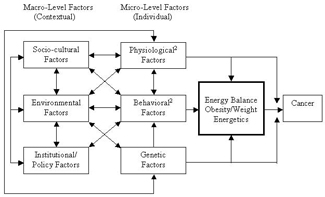Concept and Application Information
|
Executive Summary from the TREC Pre-Application Conference Call on August 16, 2004
New RFAs on Transdisciplinary Research on Energetics and Cancer.
Applications due November 16, 2004
|
|
The National Cancer Institute (NCI) invites applications to establish the Transdisciplinary Research on Energetics and Cancer (TREC) Centers in nutrition, energetics1, energy balance, and physical activity. These Centers will involve scientists from multiple disciplines and will encompass projects spanning the biology and genetics of behavioral, socio-cultural, and environmental influences upon nutrition, physical activity, weight, energy balance, and energetics.
The Centers will focus on two great challenges in the area of energetics/energy balance and cancer and they are:
- To enhance our understanding of the mechanisms underlying the association between energy balance and carcinogenesis across the cancer continuum from causation and prevention though survival
- To develop effective innovative approaches with broad population impact at the social-environmental and policy level for prevention of obesity with particular emphases on children and critical time periods among adults where weight gain is likely to occur, such as during smoking cessation, cancer treatment, and major life transitions involving work or family.
These challenges require integration of diverse disciplines, spanning the full range of cancer research from the molecular biology of carcinogenesis to public policy research.
The primary mission of the TREC Centers is to foster collaboration among transdisciplinary teams of scientists with the goal of accelerating progress towards reducing cancer incidence, morbidity, and mortality associated with obesity, low levels of physical activity, and poor diet (See Figure 1: TREC Conceptual Model below). The second mission of these centers is to provide training opportunities for new and established scientists who can carry out integrative research on energetics, energy balance, and its consequences.
Figure 1: TREC Conceptual Model
 View Larger Image View Larger Image
Note: The model presented above is not comprehensive, but represents a general conceptual framework illustrating the major factors that may contribute to obesity/weight/energy balance within the context of cancer. The specific physiological mechanisms responsible for the influence of obesity/weight/energy balance on cancer are not delineated in this model. Moreover, the specific physiological, behaviors, psychological, social, environmental, and institutional mechanisms that may influence the development of obesity/weight gain/energy imbalance are not delineated.
1 Energetics -- The study of the flow and transformation of energy through living systems - The American Heritage Dictionary, 2000.
2 Physiological and Behavioral Factors contribute to the additional factors of Personality (e.g., extraversion), Psychological Factors (e.g., stress), and Cognitive Factors (e.g., beliefs)
|
